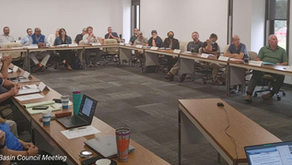Focus On These Key Facilitation Tips To Avoid Failure
- JD Solomon
- Aug 4, 2020
- 2 min read
Updated: Dec 18, 2022

Good facilitators do a respectable job at both planning and executing their sessions, and normally excel at one or the other. Keeping the basic facilitation roles and responsibilities in mind allows the facilitator to focus during sessions and to improve in key areas between assignments. Focusing on three troubleshooting skills also helps separate the good from the average facilitator.
Basic Facilitation Roles and Responsibilities
Facilitation has many definitions. The industry-leading definition, and the operable definition used throughout this paper, is "a facilitated session is a structured meeting in which the meeting leader (the facilitator) guides the participants through a series of predefined steps to arrive at a result that is created, understood, and accepted by all participants.
Prepare in advance - “who, what, when, why, where, and “how”
Plan and distribute the written agenda
Define objectives at the beginning of the event
Establish expectations
Guide the group in presenting and sharing information
Provide closure and reiterate action items
Basic Troubleshooting
There are three areas of troubleshooting skills that are common to all good facilitators. Good facilitators are respectable in all three areas. Great facilitators excel in all three subgroups.
Staying On-Task and On-Time
Staying on-task and on-time include:
Remind the group of the keep-focused expectation
Do not be afraid to directly re-focus the group on a particular agenda item
Try to close each item or set it aside in a “parking lot” for consideration later
Let the group decide on tradeoffs between staying on-task or on time when issues arise
Dealing with unproductive behavior
Facilitators understand that some form of unproductive behavior during a session is the norm and not the exception. Some tips for dealing with unproductive behavior include:
Use gentle and appropriate humor for redirection
Restate the ground rules directly
Direct questions to the individual for clarification
Seek help from the group
Address the issue during a break or offline
Stimulating Productive Inquiry, especially related to subject matter experts (SMEs)
Stimulating productive inquiry is truly both a function of planning and execution. It also requires practice and experience working in different situations. Finding the balance between SMEs that either dominate or retreat from engagement is important for discussion to be productive.
Use probing questions
Invite the experts to speak up
Call on individuals in the group
Invite debate
Applying It
Keeping the basic facilitation roles and responsibilities in mind allows the facilitator to focus during sessions and to improve in key areas between assignments. It starts with learning and delivering the basic duties well. Focusing on three troubleshooting skills helps separate the good from the average facilitator.
JD Solomon Inc provides facilitation, asset management, and program development solutions at the nexus of facilities, infrastructure, and the environment. Contact us for more information on providing facilitation for your organization or training your future facilitators.




Comments